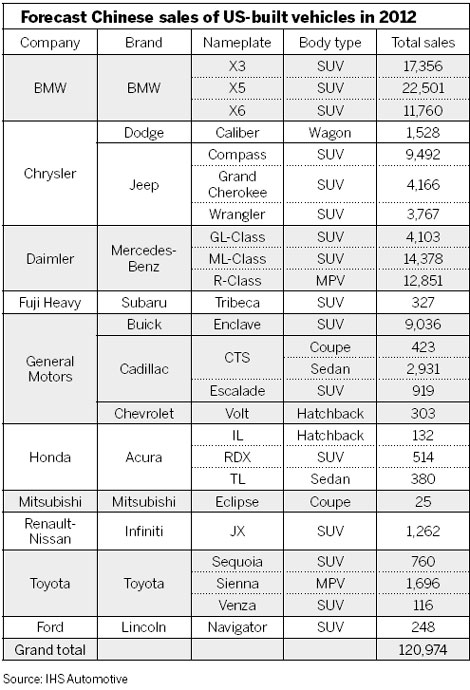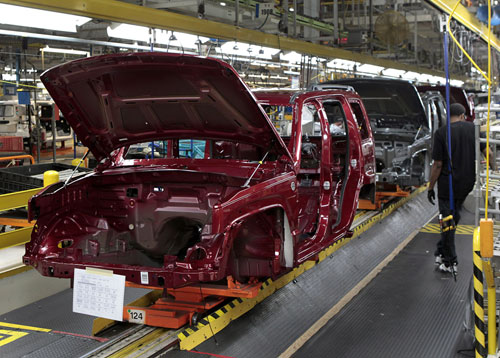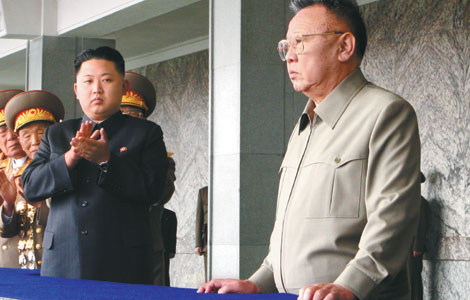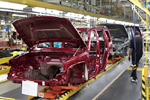Car companies weigh response to new tariffs
Updated: 2011-12-20 09:49
By Li Fangfang and Ariel Tung (China Daily)
|
|||||||||||
|
Chrysler Group LLC's production line for the Jeep Liberty in Toledo, Ohio. In 2010, the United States exported about $3.5 billion worth of vehicles to China. [Photo/Bloomberg] |
BEIJING / NEW YORK - China's new two-year anti-dumping and anti-subsidy tariffs on cars imported from the United States are not expected to have a great impact on the automobile industry, analysts said.
The automakers affected by the policy change meanwhile said they are considering whether the new duties will lead them to increase the prices of their vehicles.
On Wednesday, the Ministry of Commerce said the new tariff rates will range from 2 percent to 21.5 percent and the tariffs would be imposed starting the following day on cars and SUVs that were built in the US and have engines of 2.5 liters or larger.
The decision was the latest retribution inflicted in a series of trade disputes that has recently arisen between China and the US.
Chinese authorities, saying US imports were "damaging the local car industry", imposed the new tariffs on these companies or operations: General Motors Co (GM); Chrysler Group LLC; Mercedes-Benz US International Inc; BMW AG's factory in Spartanburg, South Carolina; and Honda of America Manufacturing Co.
Many analysts said the duties appear to be a "retaliatory measure" taken by China in response to the US's refusal this year to reduce the tariffs it charges on Chinese-built tires.
On the other hand, the action, which "reflects the rising tensions between China and the US on trade matters", will have only a small effect on the industry, said Bill Russo, founder and president of Synergistics Ltd, an international advisory firm.
Namrita Chow, senior analyst with the information company IHS Automotive, said China is expected to import less than 1 percent of the light vehicles it needs from the US in 2012, a year in which more than 19 million of vehicles are expected to be sold in its borders.
In 2010, the US exported about $3.5 billion worth of vehicles to China, an amount that is projected to increase to almost $4.5 billion this year.
Zhu Bin, a light-vehicle sales analyst for IHS Automotive in Shanghai, said the automobile models most likely to be affected by the tariffs are the Buick Enclave, the Cadillac CTS and the Jeep Cherokee.
Various other models now imported from the US to China are either sold in very small numbers or are subject to such small duties that their prices will scarcely increase, Zhu said.
"Despite the frenzy surrounding the tariffs being imposed on US-built models in China, the data shows that the actual impact of the move will not be dramatic," Chow said. "The new tariffs will raise prices for buyers in China, but buyers of these models already pay a hefty 25 percent import duty."
"The impact on GM is very limited. GM imports less than one-half of 1 percent of its Chinese volume, and the involved Cadillac vehicles are sold to customers who are less sensitive to price," Russo said.
Himanshu Patel, an analyst with the financial-services company JP Morgan, said the new tariff faced by GM - which is composed of an 8.9 percent anti-dumping duty and a 12.9 percent anti-subsidy duty - will not lower the company's profits in China by much.
Ford, for its part, imports only one automobile model to China and is not likely to notice a great effect. Chrysler, though, relies heavily on import sales.
"The tariff impacts Chrysler significantly since they import about 24,000 vehicles, and have no local partnerships after the separation from Daimler. This action will have a significant impact on pricing for models like the Wrangler and Grand Cherokee," Russo said.
Itay Michaeli, a New York-based analyst for Citigroup Inc, wrote in a note to clients that the German car maker BMW has the most "material exposure" to the tariff since it exports about 25,000 SUVs a year from the US to China.
On Monday, the Chinese branches of GM, Chrysler and Daimler AG all said they have not decided how the tariffs will affect their vehicles' prices.
A salesman at Da Shi Hang Auto Co, Cadillac's dealership in Beijing, said the prices of affected Cadillac models will remain unchanged in the short term.
The dealer, who declined to give his full name, said the tariff's consequences may not become noticeable until after the Spring Festival, when dealers begin to sell out of the imported models they had in stock before the policy change.
A dealer who sells Chrysler's Jeep brand and declined to provide his name said that the US automaker's SUVs have been quite popular recently, forcing Jeep lovers to stand in line or pay extra money to get them.
"The extra tax - which amounts to several tens of thousands of yuan - won't change these potential customers' shopping list, since they are not as affected by prices as are sedan buyers," the dealer said.
In response to the new tariffs, carmakers can either pass on their higher costs to consumers or try to absorb them themselves. Doing the latter will affect their profits, Russo said.










